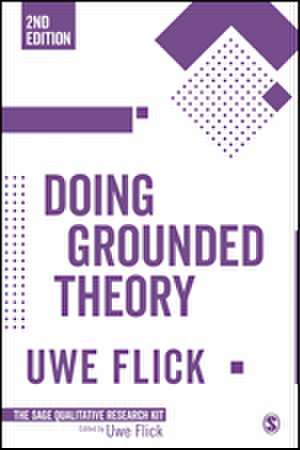Doing Grounded Theory: Qualitative Research Kit, cartea 9
Autor Uwe Flicken Limba Engleză Paperback – 12 oct 2018
Din seria Qualitative Research Kit
-
 Preț: 315.76 lei
Preț: 315.76 lei -
 Preț: 315.20 lei
Preț: 315.20 lei -
 Preț: 315.20 lei
Preț: 315.20 lei -
 Preț: 316.29 lei
Preț: 316.29 lei -
 Preț: 315.47 lei
Preț: 315.47 lei -
 Preț: 316.29 lei
Preț: 316.29 lei -
 Preț: 333.64 lei
Preț: 333.64 lei -
 Preț: 337.51 lei
Preț: 337.51 lei -
 Preț: 335.01 lei
Preț: 335.01 lei - 26%
 Preț: 1699.05 lei
Preț: 1699.05 lei
Preț: 315.47 lei
Nou
Puncte Express: 473
Preț estimativ în valută:
60.37€ • 62.28$ • 50.38£
60.37€ • 62.28$ • 50.38£
Carte disponibilă
Livrare economică 06-20 martie
Livrare express 19-25 februarie pentru 30.17 lei
Preluare comenzi: 021 569.72.76
Specificații
ISBN-13: 9781473912007
ISBN-10: 1473912008
Pagini: 176
Dimensiuni: 156 x 234 x 11 mm
Greutate: 0.34 kg
Ediția:1
Editura: SAGE Publications
Colecția Sage Publications Ltd
Seria Qualitative Research Kit
Locul publicării:London, United Kingdom
ISBN-10: 1473912008
Pagini: 176
Dimensiuni: 156 x 234 x 11 mm
Greutate: 0.34 kg
Ediția:1
Editura: SAGE Publications
Colecția Sage Publications Ltd
Seria Qualitative Research Kit
Locul publicării:London, United Kingdom
Cuprins
1. Background: Approaches and philosophies of grounded theory
2. Doing grounded theory: Key components, process, and elements
3. Getting in: Data collection in grounded theory
4. Grounded theory coding: Ways and versions
5. Going ahead: Recent developments in data analysis
6. Going beyond: Theoretical sampling, sorting, and saturation
7. Output: Writing and quality in grounded theory
8. Advancing: Research design in grounded theory
9. Becoming systematic: Triangulation in grounded theory
10. Rounding Up: Doing perspectivist grounded theory
2. Doing grounded theory: Key components, process, and elements
3. Getting in: Data collection in grounded theory
4. Grounded theory coding: Ways and versions
5. Going ahead: Recent developments in data analysis
6. Going beyond: Theoretical sampling, sorting, and saturation
7. Output: Writing and quality in grounded theory
8. Advancing: Research design in grounded theory
9. Becoming systematic: Triangulation in grounded theory
10. Rounding Up: Doing perspectivist grounded theory
Notă biografică
Uwe Flick is Senior Professor of Qualitative Research in Social Science and Education at the Freie Universität Berlin, Germany. He is a trained psychologist and sociologist and received his PhD from the Freie Universität Berlin in 1988 and his Habilitation from the Technical University Berlin in 1994. He has been Professor of Qualitative Research at Alice Salomon University of Applied Sciences in Berlin, Germany and at the University of Vienna, Austria. Previously, he was Adjunct Professor at the Memorial University of Newfoundland in St. John¿s, Canada; a Lecturer in research methodology at the Free University of Berlin; a Reader and Assistant Professor in qualitative methods and evaluation at the Technical University of Berlin; and Associate Professor and Head of the Department of Medical Sociology at the Hannover Medical School. He has held visiting appointments at the London School of Economics, the Ecole des Hautes Etudes en Sciences Sociales in Paris, Cambridge University (UK), Memorial University of St John¿s (Canada), University of Lisbon (Portugal), Institute of Higher Studies in Vienna, in Italy and Sweden, and the School of Psychology at Massey University, Auckland (New Zealand). His main research interests are qualitative methods, social representations in the fields of individual and public health, vulnerability in fields like youth homelessness or (forced) migration. He is the editor of The SAGE Handbook of Qualitative Data Analysis (Sage, 2014), The SAGE Qualitative Research Kit (Sage, 2nd edn, 2018), A Companion to Qualitative Research (Sage, 2004), Psychology of the Social (Cambridge University Press, 1998). His most recent publications areDoing Grounded Theory (Sage, 2018), Doing Triangulation and Mixed Methods (Sage, 2018), The SAGE Handbook of Qualitative Data Collection (editor, Sage, 2018), the third edition of Introducing Research Methodology ¿ Thinking Your Way through Your Research Project (Sage, 2020) and Doing Interview Research - The Essential How To Guide (Sage 2021), The SAGE Handbook of Qualitative Research Design(editor, Sage, 2022), and the seventh edition of An Introduction to Qualitative Research(Sage, 2022). In 2019, Uwe Flick received the Lifetime Award in Qualitative Inquiry at the 15th International Congress of Qualitative Inquiry.
Descriere
This short, easy to read introduction to grounded theory covers each stage of the process from formulating a research question to coding and forming theories from data, helping the reader to employ the method in their research project.
